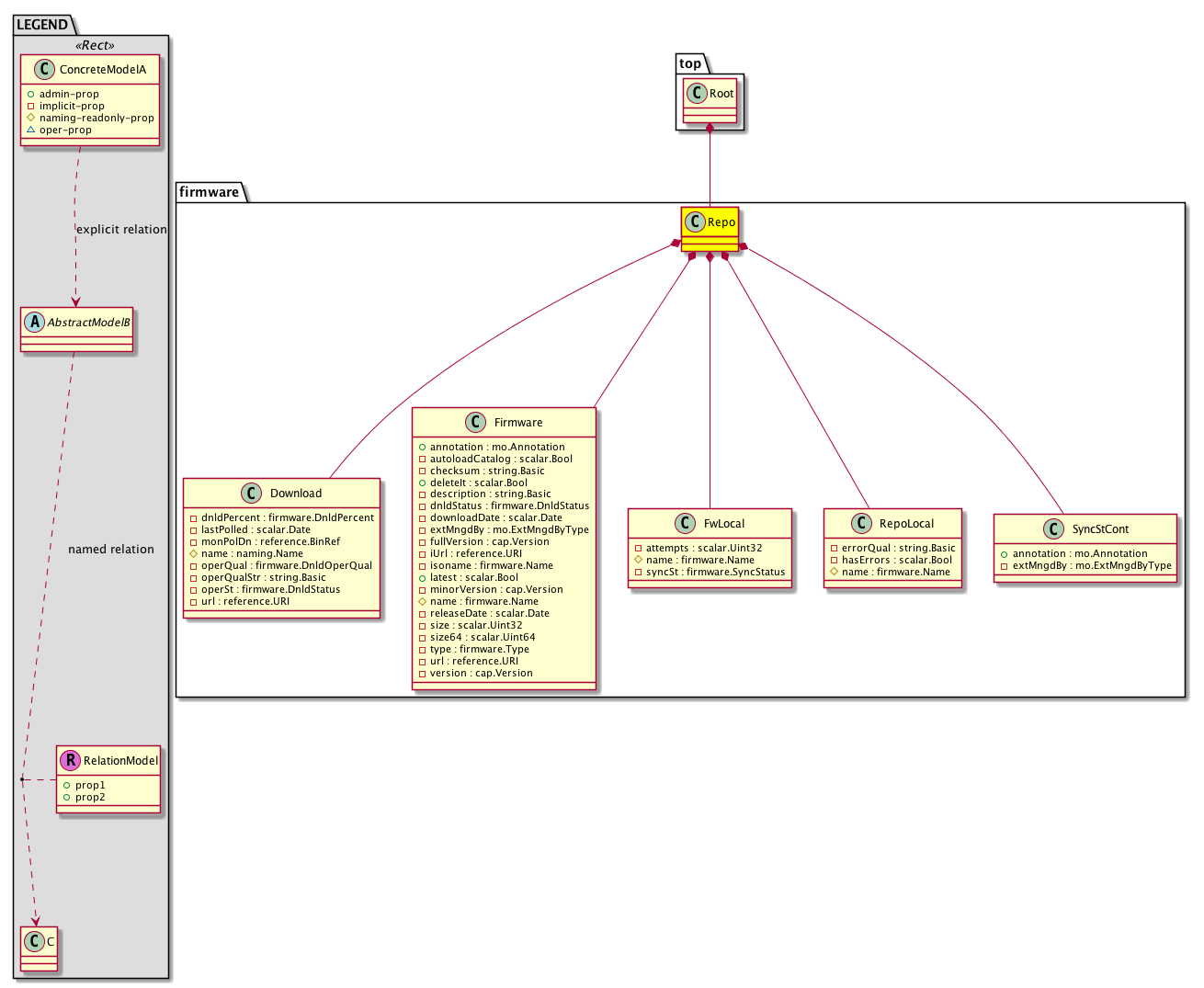![[V]](styles/eye.gif) |
firmware:Repo The firmware repository contains all downloaded and available firmware images. |
├
|
![[V]](styles/eye.gif) |
fault:Counts An immutable object that provides the number of critical, major, minor, and warning faults raised on its parent object and its subtree. |
├
|
![[V]](styles/eye.gif) |
firmware:Download Information about the last download attempted from a specific source. |
|
├
|
![[V]](styles/eye.gif) |
fault:Counts An immutable object that provides the number of critical, major, minor, and warning faults raised on its parent object and its subtree. |
|
├
|
![[V]](styles/eye.gif) |
fault:Inst Contains detailed information of a fault. This object is attached as a child of the object on which the fault condition occurred. One instance object is created for each fault
condition of the parent object. A fault instance object is identified by a fault code. |
|
|
├
|
![[V]](styles/eye.gif) |
aaa:RbacAnnotation RbacAnnotation is used for capturing rbac properties of any apic object
Objects can append rbacannotations as Object->RbacAnnotation which
is then checked for domain eligibility |
|
├
|
![[V]](styles/eye.gif) |
health:Inst A base class for a health score instance.(Switch only) |
|
├
|
![[V]](styles/eye.gif) |
aaa:RbacAnnotation RbacAnnotation is used for capturing rbac properties of any apic object
Objects can append rbacannotations as Object->RbacAnnotation which
is then checked for domain eligibility |
|
├
|
![[V]](styles/eye.gif) |
fault:Counts An immutable object that provides the number of critical, major, minor, and warning faults raised on its parent object and its subtree. |
|
├
|
![[V]](styles/eye.gif) |
fault:Inst Contains detailed information of a fault. This object is attached as a child of the object on which the fault condition occurred. One instance object is created for each fault
condition of the parent object. A fault instance object is identified by a fault code. |
|
|
├
|
![[V]](styles/eye.gif) |
aaa:RbacAnnotation RbacAnnotation is used for capturing rbac properties of any apic object
Objects can append rbacannotations as Object->RbacAnnotation which
is then checked for domain eligibility |
|
├
|
![[V]](styles/eye.gif) |
health:Inst A base class for a health score instance.(Switch only) |
├
|
![[V]](styles/eye.gif) |
firmware:FwLocal The firmware synchronization status. The firmware synchronization is created in the local boot manager for each file synchronized form the other IFCs in the cluster. |
|
├
|
![[V]](styles/eye.gif) |
fault:Counts An immutable object that provides the number of critical, major, minor, and warning faults raised on its parent object and its subtree. |
|
├
|
![[V]](styles/eye.gif) |
fault:Inst Contains detailed information of a fault. This object is attached as a child of the object on which the fault condition occurred. One instance object is created for each fault
condition of the parent object. A fault instance object is identified by a fault code. |
|
|
├
|
![[V]](styles/eye.gif) |
aaa:RbacAnnotation RbacAnnotation is used for capturing rbac properties of any apic object
Objects can append rbacannotations as Object->RbacAnnotation which
is then checked for domain eligibility |
|
├
|
![[V]](styles/eye.gif) |
health:Inst A base class for a health score instance.(Switch only) |
├
|
![[V]](styles/eye.gif) |
firmware:RepoLocal
Synchronization status of the firmware repo. This MO is created in the bootmgr local shard
|
|
├
|
![[V]](styles/eye.gif) |
fault:Counts An immutable object that provides the number of critical, major, minor, and warning faults raised on its parent object and its subtree. |
|
├
|
![[V]](styles/eye.gif) |
fault:Inst Contains detailed information of a fault. This object is attached as a child of the object on which the fault condition occurred. One instance object is created for each fault
condition of the parent object. A fault instance object is identified by a fault code. |
|
|
├
|
![[V]](styles/eye.gif) |
aaa:RbacAnnotation RbacAnnotation is used for capturing rbac properties of any apic object
Objects can append rbacannotations as Object->RbacAnnotation which
is then checked for domain eligibility |
|
├
|
![[V]](styles/eye.gif) |
health:Inst A base class for a health score instance.(Switch only) |
|
├
|
![[V]](styles/eye.gif) |
aaa:RbacAnnotation RbacAnnotation is used for capturing rbac properties of any apic object
Objects can append rbacannotations as Object->RbacAnnotation which
is then checked for domain eligibility |
|
|
├
|
![[V]](styles/eye.gif) |
aaa:RbacAnnotation RbacAnnotation is used for capturing rbac properties of any apic object
Objects can append rbacannotations as Object->RbacAnnotation which
is then checked for domain eligibility |
|
|
|
├
|
![[V]](styles/eye.gif) |
aaa:RbacAnnotation RbacAnnotation is used for capturing rbac properties of any apic object
Objects can append rbacannotations as Object->RbacAnnotation which
is then checked for domain eligibility |
├
|
![[V]](styles/eye.gif) |
health:Inst A base class for a health score instance.(Switch only) |
|

